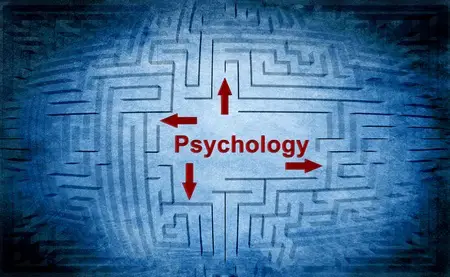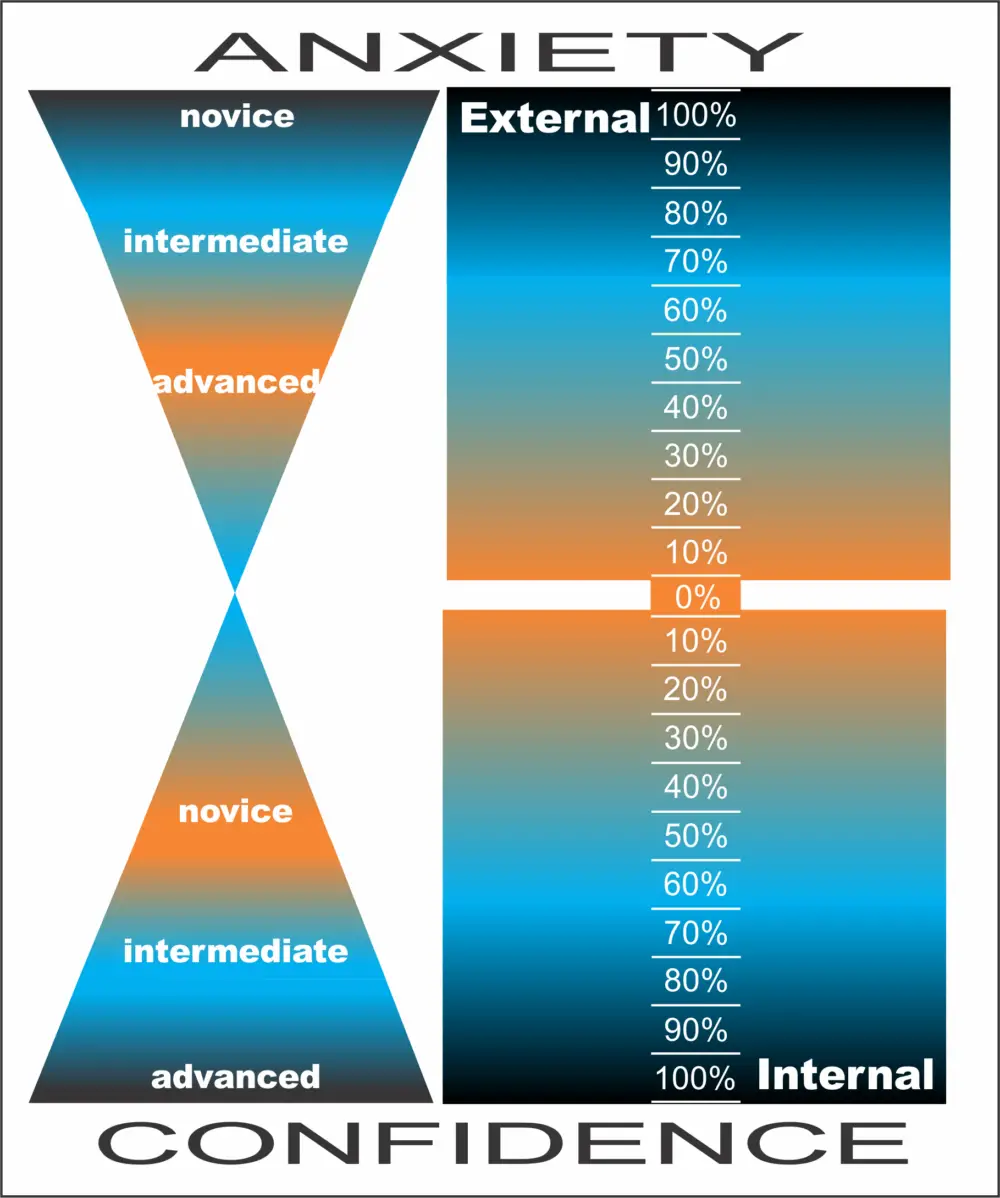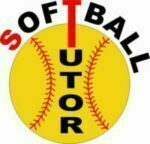
The focus for softball players as they grow through the game, generally moves from the skills and environment of the game (external) to the psychology of the game (internal). With this concept, I will discuss the use of control and how it can effect performance enhancement from novice to the advanced athletes.
Performance Enhancement
The Performance enhancement diagram is a way that I created to look at emotions that softball players may experience, and how they impact performance. What this image displays, is that a new player or beginner, will generally have more anxiety based on external factors, and advanced players will often have anxiety based more on internal factors. This is because as players abilities develop, teams align in skill level, so confidence and internal skills become more important. The purpose, is to provide a visual of how anxiety and confidence can affect players in different ways depending on their skill levels. In addition, as players develop their mental game, they will also find the desire to control the external domain diminishing. Players can then learn how little control they really have on much of the external softball environment and how controlling their internal actions can positively effect performance.
Anxiety
Anxiety in softball can make the experience as difficult as writing a final exam that was not studied for. This is where performance enhancement can have an effect in other areas. At the same time, it can provide the needed energy to perform with intensity. There are many external events that can have an effect on anxiety with positive and negative results. Players can be so fearful that they are going to make a mistake, that they don’t really even want to make the attempt. “What if the ball comes to me and I miss it? What are my teammates going to think? What are the opponents and spectators going to think?”. Players can be so worried about how others are going to react, and how they may be judged that they become almost frozen.
A novice player for example is very aware when she makes a mistake, or how her coach, parents or team mates are watching her when the ball is hit off the bat. The difference in skills can vary at the beginner or novice level depending on the age of the players and their experience with other sports. Like with any new skill, the learning curve and the path of their performance enhancement will often depend on the players developmental level and natural ability. Their feelings of success might also be determined by their comparison to other players.
As players get more experience, they might start thinking more about making a mistake because they know they are capable. Expectations are higher at this level and there is generally more focus on ability. What if she gets subbed out because she threw the ball past the receiver too many times. What if she strikes out each time she is at bat. This is more of an internal focus on her skills and abilities in relation to the task at hand.
More advance players will often feel anxiety based on internal factors and longer term goals. This is how performance enhancement is effected for them. They know how to field and throw, so it is not even on the radar as far as confidence. The game generally has more complicated components such as defensive and offensive plays. Skill execution includes more pressure because both teams are playing at a higher level so mistakes are more costly. Internal skills such as distraction control and focus become even important.
Confidence
Confidence in performance enhancement can be a key to success, and yet it can also hold athletes back from success. Feeling good or bad about their skills, and their ability to perform, can even make the difference in continuing or discontinuing in softball. All too often, players believe that they need to be perfect & hit home runs to gain confidence. The truth is that being able to self evaluate, and have a comfortable starting point to improve from, will do wonders at enhancing the enjoyment of the game. This leads naturally to confidence if the coach can help them to keep it in perspective. When players are focused on attempting to control the outcome, even at the intermediate and advanced levels, confidence can be hard to find.
Confidence is something that players usually gain as they learn the game. A new player will be more likely to gain confidence from outside factors such as a compliment from the coach or a team mate. She is more focused on learning this complicated game and making the right plays at the right time. An intermediate player might be learning new mental training skills and is now beginning to use them during a game. She might feel confidence from knowing internally that she fielded a hard hit ball cleanly. Advanced softball players might be playing the game with an increased focus on mental training. Their fundamental skills should be very well learned and natural by this point and they can rely on that confidence. It is the mastery of mental skills that will often dictate success at this level.

The Athlete
There are times when players feel great, times when they feel like they can do nothing right and times when they are kind of coasting. This can affect performance enhancement, and it can affect how they feel at the end of the day. As players progress through the development of technical skills and the game itself, they gain a level of competence. This is when skills shift from novice to intermediate and then to advanced. Each of these skill levels carry with them, different levels of expectations. The trick in this process, is to decipher what the individual expectations are, and what they can control as they improve. The ability to develop internal control over how the external environment effects them will go a long way achieving this success.
Using this tool
By having a visual of how players might be gauging their success, we can help them in their transition through the game based on their confidence and anxiety levels. This helps to monitor performance enhancement. When they are new, focusing on high level mental training skills is not necessarily useful because they have not yet mastered the basic technical skills. Some simple mental skills like goal setting with the coaches help can be useful. A youth player who is just entering the game is going to focus on learning how to throw rather than throwing under pressure. As players improve, goal setting skills might be more in line with advanced mental skills such as distraction control than technical and tactical skills.
If we can teach players to focus on the process and let the outcome take care of itself, we can help them to gain confidence and feel good about the small successes. By learning to put the focus where they have control, anxiety will also lessen and performance enhancement can thrive. The technical and tactical components of the game (external) are not as much of a focus as they advance and the skill differential narrows. The difference as this happens will be the ability to perform the skills under pressure which is why the internal skills such as mental training become more important to success.

